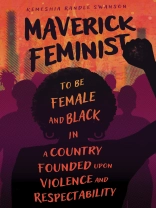Winner of the 2024 Eudora Welty Prize
Beginning with their forced introduction to American soil, Black women have relied on maverick-like characteristics to survive. And yet, these liberating qualities have been repeatedly disparaged by the masses in favor of an elitist politics of respectability. In
Maverick Feminist: To Be Female and Black in a Country Founded upon Violence and Respectability, scholar Kemeshia Randle Swanson examines the extent to which the politics of respectability diminish joy and increase sorrow throughout the lifespan of Black women. By rejecting this damaging standard in society, Black women can wholly and attentively assist in the obliteration of racist, sexist, classist, and ableist oppression. But first, they must work towards becoming self-identified, self-actualized, and self-sexualized.
Bridging the gap between women in both the streets and the academy,
Maverick Feminist expands the traditional understandings of activism and enlarges discussions about Black female sexuality. Swanson emphasizes sexuality’s significance to the literary and sociopolitical success of Black women of the past and in this contemporary climate. Through close readings and critical analyses of fiction, nonfiction, and popular culture, Swanson argues that #Black Girl Magic and racial progression require rejecting respectability politics and developing an intimate appreciation of self.
Maverick Feminist examines texts by and about bold Black women, including Zora Neale Hurston’s
Their Eyes Were Watching God, Sister Souljah’s
The Coldest Winter Ever, Brittney Cooper’s
Eloquent Rage: A Black Feminist Discovers Her Superpower, Alice Walker’s
The Color Purple, Sapphire’s
PUSH, Roxane Gay’s
Hunger: A Memoir of (My) Body, Terry Mc Millan’s
Getting to Happy, and Michelle Obama’s
Becoming.
Maverick Feminist offers hope concerning the growing divide between scholars and the communities about which they theorize. The book celebrates centuries of agency and control that Black women have mustered and maintained in a world that seems to want nothing more than to see them prone and powerless. Ultimately, maverick feminism provides a freer means of living out, evaluating, understanding, and improving the lives of Black women.
Sobre el autor
Kemeshia Randle Swanson, a college professor, is currently serving a joint appointment in the Departments of English and African American Studies at Mississippi State University. She previously dedicated ten years of service to the Department of English at Garner-Webb University in Boiling Springs, North Carolina. Her work focuses on twentieth- and twenty-first-century African American literature, southern literature, gender and sexualities studies, and hip-hop and popular culture. She has published in edited collections such as Words, Beats, and Life: The Global Journal of Hip-Hop Culture; Like One of the Family: Domestic Workers, Race, and In/Visibility in “The Help”; and Street Lit: Representing the Urban Landscape. She is author of Maverick Feminist: To Be Female and Black in a Country Founded upon Violence and Respectability, published by University Press of Mississippi.












